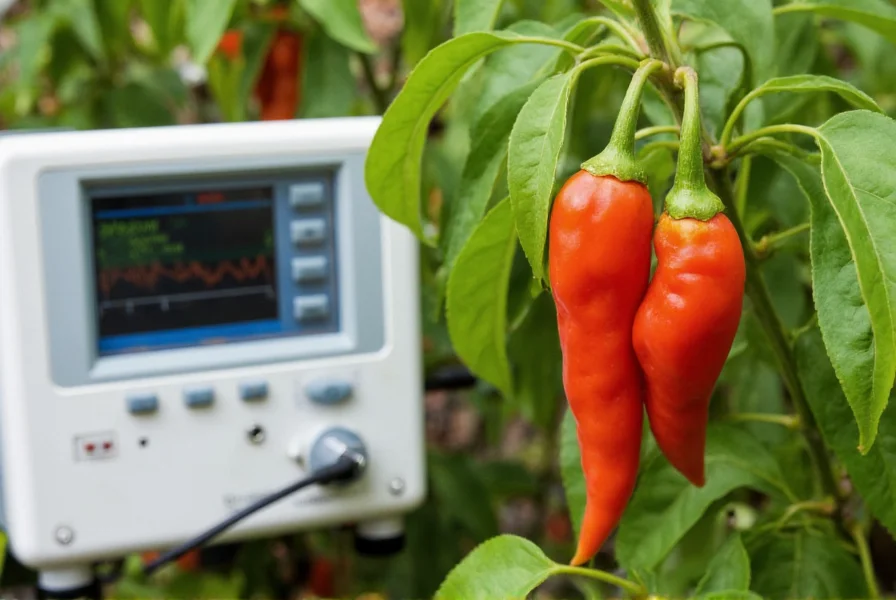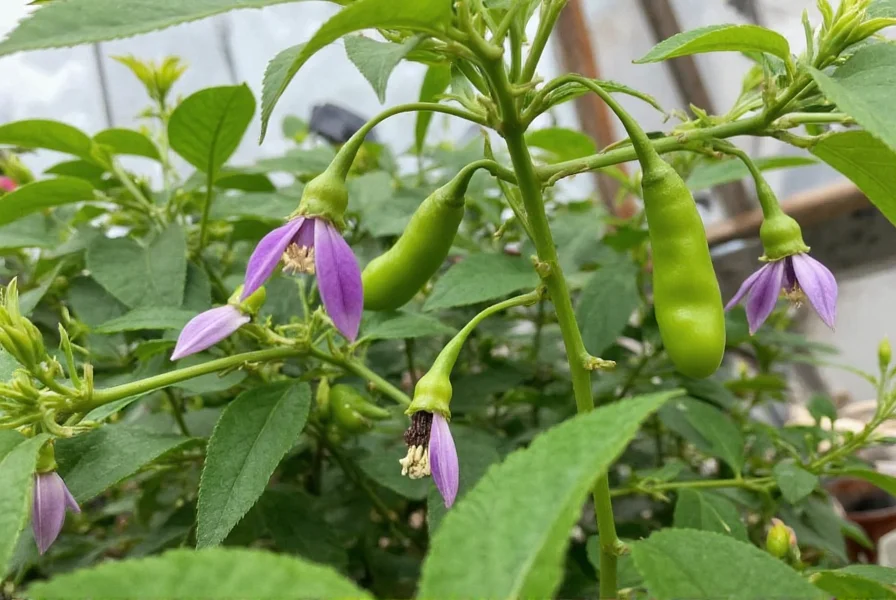When exploring the realm of super-hot peppers, the Dragon's Breath chili stands as a remarkable specimen that pushes the boundaries of capsaicin concentration. This Welsh-developed cultivar emerged in 2017 as a potential challenger to the Carolina Reaper's throne, registering an astonishing 2.48 million Scoville Heat Units during testing at Nottingham Trent University. While its official Guinness World Record status remains debated within chili enthusiast circles, the Dragon's Breath chili represents significant advancements in pepper breeding and continues to fascinate horticulturists and spice enthusiasts alike.
Understanding the Dragon's Breath Chili's Heat Profile
The Dragon's Breath chili's heat level places it among the most potent edible peppers ever documented. To put its 2.48 million SHU rating in perspective:
| Pepper Variety | Scoville Heat Units | Heat Comparison |
|---|---|---|
| Dragon's Breath | 2,480,000 SHU | Approximately 292 times hotter than a jalapeño |
| Carolina Reaper | 1,641,183 SHU (average) | About 200 times hotter than a jalapeño |
| Habanero | 100,000-350,000 SHU | 12-41 times hotter than a jalapeño |
| Jalapeño | 2,500-8,000 SHU | Baseline for comparison |
What makes the Dragon's Breath chili particularly noteworthy is its potential medical applications. Researchers noted that the extreme capsaicin concentration could serve as a temporary local anesthetic, offering possibilities for patients with allergies to traditional anesthetics. This represents an important intersection between extreme horticulture and potential medical innovation.
Origin and Development
Breeder Mike Smith of Newport, Wales, developed the Dragon's Breath chili through careful cross-pollination techniques. Working with a collection of Naga-type peppers and potentially some African species, Smith created this cultivar with the specific goal of producing an exceptionally hot pepper. The development occurred at the Royal Horticultural Society's Chelsea Flower Show in 2017, where it first gained international attention.
Unlike many super-hot peppers that prioritize heat above all else, the Dragon's Breath chili reportedly features a distinctive flavor profile with initial sweetness before the intense heat takes effect. This characteristic makes it somewhat unique among the hottest peppers, which often sacrifice flavor for pure capsaicin concentration.

Safety Considerations and Handling
Handling Dragon's Breath chili requires extreme caution due to its extraordinary heat level. Professional growers and researchers recommend:
- Wearing nitrile gloves (latex offers insufficient protection)
- Using eye protection when handling fresh peppers
- Working in well-ventilated areas to avoid inhaling capsaicin particles
- Having dairy products (milk, yogurt) readily available to counteract accidental exposure
- Avoiding contact with skin and mucous membranes at all costs
Medical professionals warn that consuming Dragon's Breath chili without proper preparation can cause severe reactions including anaphylaxis in sensitive individuals. The intense capsaicin concentration can trigger a potentially dangerous condition called 'dragon's breath syndrome'—characterized by temporary paralysis of the throat muscles—requiring immediate medical attention.
Culinary Applications and Restrictions
Due to its extreme heat, Dragon's Breath chili has very limited culinary applications. Professional chefs typically use it in minute quantities as:
- A finishing oil for specialized dishes
- A component in competitive eating challenges (with medical supervision)
- A base for specialty hot sauces intended for extreme heat enthusiasts
Most food safety organizations advise against home use of Dragon's Breath chili. The UK's Food Standards Agency has issued warnings about the potential dangers of consuming unregulated super-hot peppers. Commercial availability remains extremely limited, with most seeds and plants restricted to research institutions and licensed growers.
Growing Dragon's Breath Chili
Cultivating Dragon's Breath chili presents significant challenges even for experienced gardeners:
- Requires 90-100 days to maturity under optimal conditions
- Needs consistent temperatures between 75-85°F (24-29°C)
- Requires high humidity levels during flowering
- Soil must maintain precise pH levels between 6.0-6.8
- Pollination often requires manual intervention
Most commercial growers use controlled greenhouse environments to ensure proper development. The plants typically reach 24-36 inches in height with distinctive purple-tinged flowers before producing the characteristic small, pointed fruits that transition from green to bright red when mature.

Dragon's Breath vs. Other Super-Hot Peppers
While the Dragon's Breath chili generated significant buzz, it's important to understand its position among other extreme peppers:
- Carolina Reaper: Currently holds the official Guinness World Record with an average of 1.6 million SHU, though individual peppers have tested higher
- Pepper X: Reported to reach 3.18 million SHU, though lacks official verification
- Trinidad Moruga Scorpion: Averages around 1.2 million SHU with some specimens reaching 2 million
The debate about which pepper truly deserves the "hottest" title continues among horticulturists, with testing methodologies and growing conditions significantly affecting results. What makes Dragon's Breath notable is its combination of extreme heat with potential medical applications—a rare intersection in the super-hot pepper world.
Where to Find Dragon's Breath Chili
Due to safety concerns and limited production, Dragon's Breath chili remains difficult to obtain:
- Seeds occasionally appear through specialized horticultural suppliers (often requiring verification of growing experience)
- Some research institutions maintain limited stocks for medical studies
- Certified hot sauce producers occasionally incorporate minute quantities into specialty products
- Never available in mainstream grocery stores due to safety regulations
Those interested in experiencing Dragon's Breath chili should seek supervised tastings through reputable chili festivals or culinary events with medical personnel present. Attempting to source or consume this pepper without proper precautions carries significant health risks.
Is Dragon's Breath chili the hottest pepper in the world?
While Dragon's Breath chili tested at 2.48 million SHU and briefly gained attention as potentially the hottest pepper, it has not received official Guinness World Record certification. The Carolina Reaper currently holds the official record with an average of 1.6 million SHU, though individual Dragon's Breath specimens have tested higher. The "hottest pepper" title remains contested among horticulturists due to varying testing methods and growing conditions.
Can you buy Dragon's Breath chili peppers commercially?
Commercial availability of Dragon's Breath chili is extremely limited due to safety concerns. You won't find them in regular grocery stores. Some specialized hot sauce producers may use minute quantities in premium products, and seeds occasionally appear through horticultural suppliers that require verification of growing experience. Most legitimate sources restrict sales due to the significant health risks associated with improper handling.
What happens if you eat a Dragon's Breath chili?
Consuming Dragon's Breath chili without proper preparation can cause severe reactions including intense burning pain, difficulty breathing, temporary throat paralysis (known as 'dragon's breath syndrome'), and potentially anaphylaxis in sensitive individuals. Medical professionals recommend having dairy products available to counteract capsaicin exposure and advise against consumption without medical supervision. Even experienced chili eaters should approach this pepper with extreme caution.
Why was Dragon's Breath chili developed?
Breeder Mike Smith developed Dragon's Breath chili primarily as a horticultural achievement, pushing the boundaries of pepper heat. Interestingly, researchers discovered potential medical applications - the extreme capsaicin concentration could serve as a temporary local anesthetic for patients with allergies to traditional anesthetics. This dual purpose of extreme horticulture and potential medical innovation makes Dragon's Breath unique among super-hot peppers.
How do you safely handle Dragon's Breath chili peppers?
Safety precautions for handling Dragon's Breath chili include wearing nitrile gloves (latex is insufficient), using eye protection, working in well-ventilated areas, having dairy products readily available, and avoiding contact with skin or mucous membranes. Professional growers recommend using specialized equipment and working in controlled environments. Never handle these peppers with bare hands, and thoroughly clean all surfaces and tools after handling to prevent accidental exposure.











 浙公网安备
33010002000092号
浙公网安备
33010002000092号 浙B2-20120091-4
浙B2-20120091-4